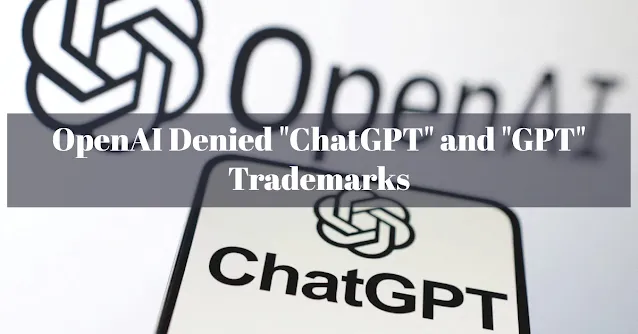The United States Patent and Trademark Office (USPTO) has dealt a blow to OpenAI, denying their applications to trademark both "ChatGPT" and "GPT." This decision, with potentially significant implications for the entire field of generative AI, opens the door for others to use these terms freely, potentially diluting OpenAI's brand identity and raising questions about the future of AI terminology ownership.
USPTO Cites Descriptiveness: Why "ChatGPT" and "GPT" Didn't Make the Cut
The USPTO's rationale for rejecting the trademark applications centers on the notion that both terms are merely descriptive. "ChatGPT" directly references the application's function as a chatbot, while "GPT" coincides with the widely used acronym for "Generative Pre-trained Transformer," a type of neural network architecture employed in many language models. The USPTO argued that granting exclusive rights to such descriptive terms could hinder competition and impede public understanding of the technology.
This raises crucial questions about trademarking technical terms in the rapidly evolving field of AI. As advancements occur at breakneck speed, established terminology might struggle to keep pace, creating legal gray areas and potential conflicts. Should generic terms like "Generative AI" or "Neural Network" be off-limits for trademarking, even by pioneering companies?
OpenAI's Options and Potential Impact
OpenAI has three months to appeal the decision to the Trademark Trial and Appeal Board. If unsuccessful, they'll have to navigate a landscape where "ChatGPT" and "GPT" become general descriptors, potentially diminishing their brand recognition and making it harder to distinguish their products from competitors.
This could also have broader implications for the AI industry. If "GPT" loses trademark protection, will other widely used terms like "BERT" or "LaMDA" follow suit? Could this open the door to confusion and misleading marketing, as companies leverage established names without necessarily offering the same technology or quality?
Beyond Trademarks: Navigating the Evolving Landscape of AI Terminology
The USPTO's decision highlights the complex interplay between innovation, terminology, and intellectual property in the AI realm. While protecting intellectual property is crucial, overly broad trademark claims could stifle development and hinder public understanding.
Moving forward, the industry needs to navigate this challenge carefully. OpenAI could consider alternative branding strategies while potentially advocating for clearer guidelines on trademarking technical terms in the ever-changing world of AI. Additionally, fostering open communication and collaboration within the research community could help establish and standardize terminology, benefiting both developers and users alike.
Beyond "GPT": The Broader Conversation about AI Ownership and Control
This trademark debate sparks a wider conversation about ownership and control within the AI space. While OpenAI might have invested heavily in developing "GPT" technology, should its name become synonymous with the entire category of generative language models? Who ultimately owns the terminology surrounding these powerful tools, and how can we ensure responsible development and ethical use?
These questions pose a significant challenge for both the legal and technical communities. As AI continues to evolve and permeate our lives, finding the right balance between protecting intellectual property, fostering innovation, and ensuring accessibility will be crucial in shaping the future of this transformative technology.





0 Comments